Iran Executes Kurdish Prisoner As Minority Oppression Continues
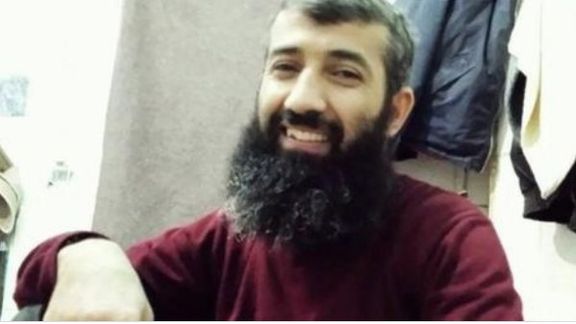
Ayub Karimi, a Sunni Kurd and a religious prisoner, was executed early on Wednesday in Karaj's Ghezel Hesar Prison.

Ayub Karimi, a Sunni Kurd and a religious prisoner, was executed early on Wednesday in Karaj's Ghezel Hesar Prison.
Karimi, who had been sentenced to death approximately 14 years ago, was transferred to solitary confinement a week before the execution. Amnesty International had issued warnings in recent days, highlighting the imminent danger of Karimi's execution and urging authorities to cancel the sentence. Despite the pleas, Karimi, along with six other prisoners whose identities remain undisclosed, was hanged Wednesday morning.
Notably, Karimi was denied a final meeting with his family before his execution, mirroring the fate of his co-defendant, Qasem Abasteh, who was executed on November 5.
The human rights organization Hengaw has identified five more religious prisoners facing imminent execution: Davoud Abdollahi, Farhad Salimi, Anwar Khezri, Khosrow Besharat, and Kamran Sheykha. All of them were arrested in 2009 and held in the intelligence ministry’s detention center in Urmia.
In 2015, they were tried and sentenced to death, a verdict confirmed by the Supreme Court in 2020 after prolonged legal battles. Despite a plea for retrial in September 2020, the Supreme Court rejected their request.
The charges against the prisoners include "War against God," "corruption on earth," "support for Salafi groups," and an alleged "murder". However, the accused individuals consistently denied any involvement in the allegations in letters published by human rights organizations.
The situation for minority rights in Iran remains precarious. In July alone, the Kurdistan Human Rights Network reported that Iranian security forces detained at least 54 Kurdish activists and citizens in the western provinces of Iran.

The Governor of the Central Bank of Iran revealed plans to open an Iranian bank in Syria as the regime continues to prop up the crumbling Assad regime.
In a meeting with Syrian Prime Minister Hussein Arnous in Damascus on Wednesday, Mohammad-Reza Farzin made the announcement as both nations grapple with severe economic challenges.
Iran, facing a persistent financial downturn since 2018 due to US sanctions following its withdrawal from the JCPOA nuclear accord, has sought avenues to strengthen economic ties with Syria, which is in the throes of years of political and economic uncertainty and war.
Farzin also expressed Iran's intention to remove the dollar from economic and trade transactions between the two countries in the coming years.
Iran has been a significant financial supporter of Syria, spending tens of billions of dollars, a substantial portion of its constrained oil revenues, to sustain President Bashar al-Assad's regime. Estimates suggest that Iran has provided between $30 billion to over $50 billion in material aid to the government since 2011, a period during which Iran's annual oil revenues averaged between $20 billion to $40 billion.
Despite a decade-long effort to preserve the Syrian government, Iran holds a relatively small share of Syria's trade and has lost out to financially stronger players. The Revolutionary Guard, justifying its extensive involvement in the Syrian war, contends that trade and investment in Syria will eventually yield returns, compensating for the substantial financial and human costs Tehran has incurred to support the Assad regime, but so far it has not come true.
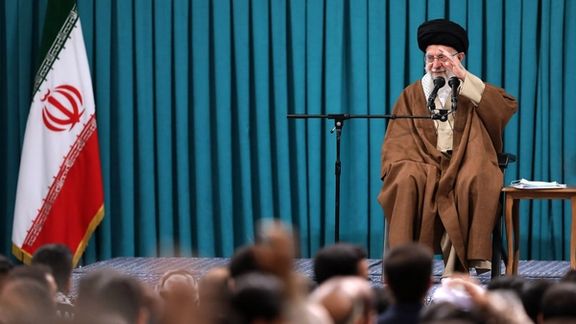
Praising the October 7 Hamas attack on Israel, Supreme Leader Ali Khamenei said on Wednesday that Iran’s policy is not “to throw Zionists and Jews into the sea.”
Speaking at a gathering in Tehran, Iran’s 84-year-old ruler said the “Al-Aqsa Storm” was against “the Zionist regime,” but its real aim was to expunge American influence in the region.
“This historic event, in the true sense of the word, was able to disrupt America's policies in this region, and God willing, this storm will continue and will erase America’s agenda."
Khamenei reiterated Tehran’s long-held policy of demanding a referendum to decide the fate of Palestine and Israel, but at the same time called for the “Al-Aqsa Strom” to be repeated, which was in essence an attack on civilians and widespread and indiscriminate killings.
"The Islamic Republic of Iran is in favor of a referendum in Palestine and respects the opinion of the people. The viewpoint of the Islamic Republic is not to annihilate the Zionists and Jews,” Khamenei said.
Khamenei and his supporters have rejected calls for a referendum in Iran to change the constitution after several rounds of popular anti-regime protests.
During his 34-year rule, Khamenei has made Israel’s destruction the top foreign policy priority of the Islamic Republic, directing vast economic resources to creating, funding and arming militant groups in the region whose aim is to fight the Jewish state. Palestinian armed groups as well as the Lebanese Hezbollah have been sustained by Tehran’s full support.
In his speech, Khamenei harshly condemned the Israeli attacks in Gaza, without mentioning that the campaign began after Hamas killed 1,200 people in Israel, mostly civilians. He insisted that Israel’s military operation has been a disgrace for the United States and other Western countries that have supported it, claiming that 5,000 children have been killed by phosphorus bombs.
After a strong international reaction to the Hamas attack, the Iranian regime tried to argue that it had no foreknowledge of the operation. However, many find it hard to believe that Hamas would engage in such a risky adventure without first clearing it with its most important patron. Claiming no role in the October 7 terror attack, the Islamic Republic has avoided direct military involvement in the ensuing war, despite boasting for years of having a destructive ballistic missile arsenal directed against Israel.
In the same vein, the Lebanese Hezbollah has also avoided a full war with Israel, limiting its activities to border skirmishes.
Khamenei also dismissed US efforts to forge a new Middle east, saying that their plans in Lebanon and the occupation of Iraq have all failed. They were also unable to shape Syria according to their liking, he said, accusing Washington of engineering the revolt against the government of Bashar al-Assad.
"The political geography of the region is undergoing changes, but not in favor of the United States; rather, in favor of the Resistance Front. Yes, the geopolitical map of West Asia has changed, but in favor of the resistance, and the resistance has emerged victorious,” Khamenei said referring to all the proxy forces the Islamic Republic has created and nurtured in the region.
The Hamas attack and the ensuing Gaza war have for now halted the normalization process between Israel and Saudi Arabia, which Iranian officials have highlighted in recent weeks.
Khamenei went on to emphasize that the current trend in the region is to eradicate US influence and power, calling it “American hegemony.”
"Today, politics and orientation in this region are about getting rid of America. One of the clear and prominent signs that is evident today is the Al-Aqsa Storm. Yes, this storm is against the Zionist regime, but it is about getting rid of America," Khamenei declared.
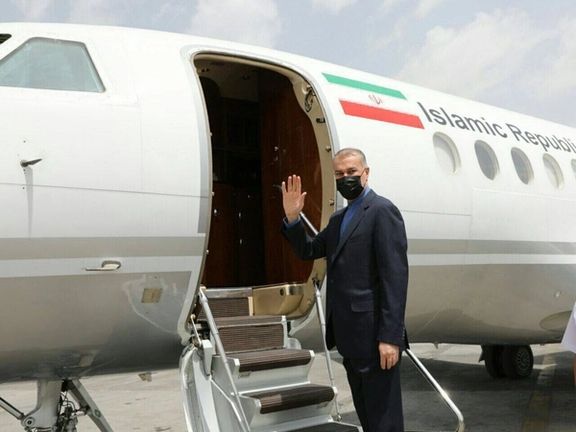
Iran's Foreign Minister claims that a delayed visa issuance by Washington prevented his attendance at the United Nations Security Council (UNSC) session on the Gaza war in New York.
Scheduled for Wednesday, the UNSC meeting aimed to address the ongoing situation in Gaza following the Hamas invasion of Israel on October 7. At least 1,200 mostly civilians were murdered and 240 more taken hostage. Retaliatory attacks have since left more than 15,000 dead in Gaza and tens of thousands displaced.
Currently, a temporary ceasefire is in place as a hostage release takes place. In return, Israel is allowing the release of Palestinian prisoners in Israel's jails.
Hossein Amir-Abdollahian informed reporters that the United States issued his visa too late, making it logistically impossible for him to travel to New York in time for the session.
"It was planned that this week President Ebrahim Raeisi's official trip to Ankara would take place, and everything was coordinated. However, because the United Nations Security Council had a session regarding the situation in Gaza and the continuation of the ceasefire, the foreign ministers were invited," Amir-Abdollahian stated.
The UNSC session was called upon China's request, as the nation currently holds the rotating presidency. China, traditionally tied to the Palestinian side, has taken a largely hesitant and restrained stance on the Israel-Gaza conflict. This approach is further influenced by China's growing economic relationship with Israel, contributing to its reluctance to take a definitive side in the ongoing conflict.
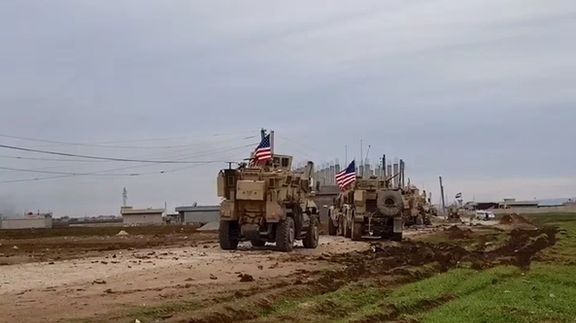
After weeks of rocket and drone attacks on US forces in Syria and Iraq, Iran has once again denied involvement in such attacks.
Iran’s ambassador to the UN claimed Tuesday that his country has “never had a hand in actions or attacks against US military forces in Syria or elsewhere.”
American troops in the region have been targeted at least 73 times since Israel began its onslaught on Gaza in response to the Hamas attack of 7 October, which killed 1,200. Iran-backed militant groups in Iraq and Syria have claimed responsibility for the attacks, but Tehran has claimed they are acting independently, angered by the war in Gaza.
However, the Islamic Republic calls these militant groups part of its axis of resistance against the United States and Israel. Almost every armed group that has targeted US forces in recent weeks is backed by or affiliated with the regime in Iran.
And yet Ambassador Iravani flatly denied any Iranian involvement and called such claims “baseless accusations’ – just as an IRGC-affiliated news agency published a video purporting to show images of the aircraft carrier USS Dwight D. Eisenhower being monitored with drones while passing through the Strait of Hormuz.
USS Eisenhower was deployed to the Middle East last month as concerns grew that the war on Gaza could spread across the region. The deployments – including warships and THAAD and Patriot batteries – were meant to deter hostile forces from attacking US personnel and interests.
But they seem to have failed to do so.
While Iran-backed groups have regularly attacked American bases in Iraq and Syria, injuring dozens, the Houthis in Yemen have seized a container ship and frequently launched missiles, including a ballistic missile last weekend that aimed at a US warship in the Gulf of Aden. The US has issued a warning to commercial shipping in the Indian Ocean.
The Pentagon has maintained throughout that it will do whatever it takes to protect American forces. But many on the Capitol have raised questions about the Biden administration's will to address the threats posed by Iran and its proxies.
“President Biden seems to be going out of his way to avoid targeting Iranians or the resources it holds dear,” Senator Tom Cotton posted on X Tuesday. “This weakness only invites more aggression.”
Republicans in Congress have been trying hard to push the Biden administration towards a more forceful stance in dealing with the regime in Iran. Several pieces of legislation have been introduced to limit the President's freedom of action in making concessions to Tehran or reverse his administration’s policies.
One such initiative in the Senate would designate Houthis as a terrorist organization, citing the group’s weekend missile attacks on a U.S. warship as an alarming escalation.
The legislation is led by Senator Ted Cruz and six other Republicans. It will reapply all sanctions on the Houthis that were lifted in 2021 when the Biden administration took office.
“The Biden administration made a day one politically driven decision to dismantle terrorism sanctions against the Houthis and their leaders,” said Senator Cruz. “That decision was an obvious and catastrophic mistake from the very beginning, and it has only become more obvious and more catastrophic as time has gone on.
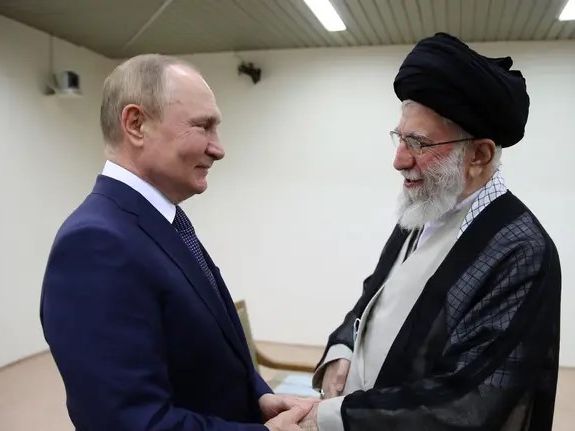
Russian President Vladimir Putin has complete deference towards Iran’s Supreme Leader Ali Khamenei and has expressed his desire to be adopted by him, an Iranian cleric says.
Ayatollah Rahim Tavvakol (71), a member of Iran’s Assembly of Experts, a constitutional body tasked with selecting the next Supreme Leader, said Putin speaks forcefully with the world, but when visits Khamenei “He sits at the edge of the chair and puts his hands on his knees. He speaks politely and with deference with the Imam.” Tavvakol went on to say that Putin, “who is a world politician, tells the Leader that he wants to be accepted as his son.”
In March, elections will take place for the parliament and the Assembly of Experts. Political insiders are scrambling to be allowed to run in these elections and get elected, a process controlled by Khamenei’s hardliner supporters.
The Islamic Republic of Iran is a close ally of Russia, but many see Khamenei’s regime as towing Moscow’s line and dependent on Russia and China amid its international isolation.
Khamenei pursues an anti-West foreign policy and emphasizes relations with non-Western countries opposed to US and European influence.
Ayatollah Tavvakol also reiterated that Khamenei regards the United States as the main enemy and emphasized that there are “nine Zionist lobbies in America.”